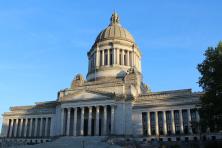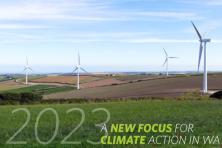The climate impacts we know are coming, and the ones we already see, are driving our urgency to act on global warming. But there is another side to the carbon math that also matters: the growing cost of investments in fossil fuel resources and its impact on consumers.
Utilities need to contemplate the following:
- The Energy Information Administration projects that fossil gas prices will nearly double by 2020. Should utilities incorporate risk when deciding whether to invest in fossil gas plants?
- Carbon emissions increasingly have economic impacts associated with climate change. Should utilities incorporate the cost of carbon when looking to invest in emitting resources?
- Reviewing oil and gasoline prices shows incredible volatility. What role should utilities play in helping Washington transition to clean electric vehicles that can save costs and reduce pollution?
The Utilities and Transportation Commission (UTC), a Washington state agency rarely in the spotlight, is responsible for answering questions like these that have a profound impact on climate pollution in the state. Charged with keeping rates affordable, the UTC must consider the economic risks of pollution and climate change in its decision-making. And, as states slate more coal facilities to retire and advances in technology lead to widespread transportation electrification, the UTC will seek answers to these and other questions as utilities decide which resources will keep your lights on - and charge your vehicle.
It’s clear that utilities will play a critical role in solving the climate crisis. As David Roberts succinctly summarized, the two-step solution to climate change is to (1) clean up the grid, and (2) to electrify everything. In large part, it’s the power utilities’ job to clean up the grid. But as a regulated industry, utilities take cues and instruction from public agencies like the UTC who are responsible for protecting all of us utility customers.
When fossil gas prices skyrocket over the next decade, the utility will pass on most of the higher energy costs to their customers, leaving their shareholders nearly unharmed with very little risk. So it’s the UTC’s job to evaluate how risky utility investments are and identify which investments aren’t in customers’ best interest. Declining water supplies, more frequent droughts, and higher sea levels result in real, tangible costs due to climate change. Similarly, it’s the UTC’s job to provide guidance on how to incorporate the increasing cost of carbon into resource decisions. As we chart the path to broad electrification, utilities will also play a major role in facilitating the transition. Ultimately, the UTC must guide utilities on how and when to invest in infrastructure that can avoid carbon – and save money – from the transportation and electricity sectors.
While the UTC doesn’t often make the headlines, it is one of the most important state agencies for protecting Washington customers from the risks of climate change. The inner workings of the UTC and the decisions the Commissioners make will have impacts for decades to come. It’s important that they get the answers to questions like these right.





